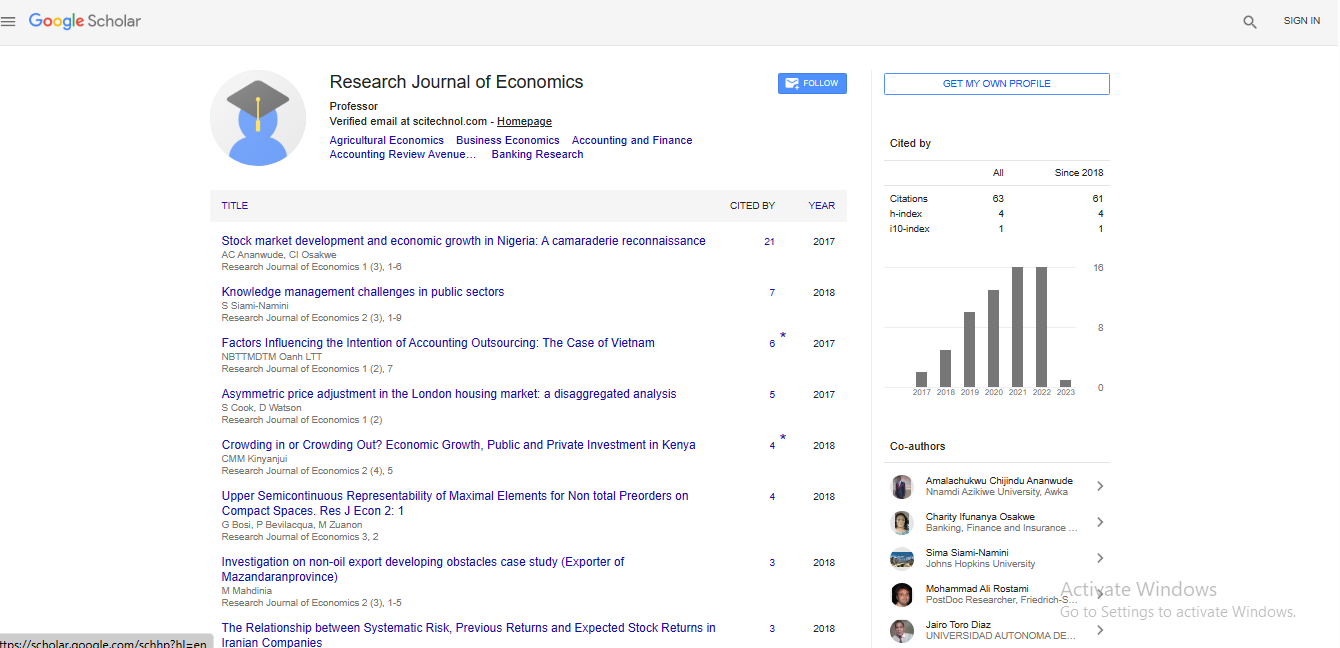Opinion Article, Res J Econ Vol: 7 Issue: 1
Adjusting the Economic Compass: Exploring Evolving Monetary and Fiscal Policy
Christos Heilmann*
Department for Global Studies, Aarhus University, Jens Chr. Skous Vej 7, Building 1465, 421, 8000 Aarhus C, Denmark
*Corresponding Author: Christos Heilmann
Department for Global Studies,
Aarhus University, Jens Chr. Skous Vej 7, Building 1465, 421, 8000 Aarhus C,
Denmark
Tel: +453256875656
E-mail: christoheilmann@cas.dk
Received date: 03 January, 2023, Manuscript No. RJE-23-89747;
Editor assigned date: 06 January, 2023, PreQC No. RJE-23-89747 (PQ);
Reviewed date: 20 January, 2023, QC No. RJE-23-89747;
Revised date: 27 January, 2023, Manuscript No. RJE-23-89747 (R);
Published date: 03 February, 2023, DOI: 10.4172/RJE.1000127
Citation: Heilmann C (2023) Adjusting the Economic Compass: Exploring Evolving Monetary and Fiscal Policy. Res J Econ 7:1.
Description
Monetary policy refers to the actions taken by a country's central bank to influence the supply and cost of money in the economy. These actions include setting interest rates, controlling the money supply, and implementing other measures to regulate credit and lending practices.
Fiscal policy, on the other hand, involves the government's decisions on how to spend money and how to collect revenue through taxes. Fiscal policy is designed to stimulate economic growth and manage economic cycles by increasing government spending, decreasing taxes, or a combination of both.
Changes in Monetary and Fiscal policies can have significant effects on the economy, as they influence factors such as interest rates, inflation, employment, and economic growth. For example, lowering interest rates through monetary policy can encourage borrowing and spending, which can stimulate economic growth. Similarly, increasing government spending through fiscal policy can create jobs and increase demand for goods and services.
Monetary and fiscal policies are two key tools that governments can use to influence economic activity and achieve various policy objectives. Here are some ways in which monetary and fiscal policy have evolved in recent years:
Unconventional monetary policy
In response to the global financial crisis of 2008, many central banks adopted unconventional monetary policy measures such as Quantitative Easing (QE) and negative interest rates. These policies aimed to stimulate economic activity by reducing borrowing costs and increasing the supply of money.
Forward guidance
Another tool that central banks have used in recent years is "forward guidance," which involves communicating to the public the expected path of monetary policy in the future. This can help anchor expectations and provide guidance to financial markets.
Fiscal stimulus
In response to the COVID-19 pandemic, many governments have implemented large-scale fiscal stimulus measures to support their economies. These measures have included direct payments to households, increased unemployment benefits, and support for businesses.
Sustainable finance
Another area of evolution in monetary and fiscal policy has been the increasing focus on sustainable finance. This involves incorporating Environmental, Social, and Governance (ESG) factors into investment decisions and policy making.
Digital currencies
Some central banks have also been exploring the potential use of digital currencies, such as Central Bank Digital Currencies (CBDCs). These currencies could potentially offer benefits such as faster and more efficient payment systems, but there are also concerns about privacy and security.
Benefits of Monetary and Fiscal Policy
Monetary and Fiscal policies are both important tools used by governments and central banks to manage their economies. Here are some of the benefits of these policies:
Monetary policy
Managing inflation: Central banks can adjust interest rates to manage inflation levels in the economy. By increasing interest rates, they can decrease borrowing and spending, which can help reduce inflation.
Stimulating economic growth: By lowering interest rates, central banks can make borrowing and spending more attractive, which can stimulate economic growth.
Regulating the money supply: Central banks can regulate the money supply by increasing or decreasing the amount of money in circulation, which can impact the overall health of the economy.
Fiscal policy
Stimulating economic growth: By increasing government spending or cutting taxes, fiscal policy can provide a boost to economic growth by creating jobs and increasing demand for goods and services.
Stabilizing the economy: During periods of recession, fiscal policy can be used to increase government spending and support businesses, which can help stabilize the economy and prevent further contraction.
Addressing income inequality: Fiscal policy can be used to address income inequality by implementing policies such as progressive taxation, which can help redistribute wealth and reduce the gap between the rich and poor.
In general, the latest changes in monetary and fiscal policy will depend on a variety of factors, including the current state of the economy, the goals of the policymakers, and the political climate. It is important to stay up-to-date on these changes to understand their potential impact on individuals, businesses, and the overall economy.
Conclusion
Overall, monetary and fiscal policies have evolved in response to changing economic conditions and new challenges, such as the global financial crisis and the COVID-19 pandemic. These changes have included new tools such as unconventional monetary policy and fiscal stimulus measures, as well as a greater focus on sustainable finance and the potential use of digital currencies.
 Spanish
Spanish  Chinese
Chinese  Russian
Russian  German
German  French
French  Japanese
Japanese  Portuguese
Portuguese  Hindi
Hindi 